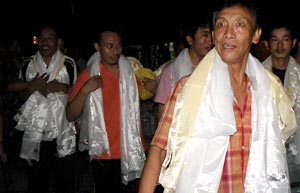
The twelve Tibetans were greeted with khatags (a Tibetan white blessing scarf) by supporters upon their release on July 10, 2011. (ICT)
The 12 were ordered released on July 10 and is the second instance in little over a year in which the Supreme Court of Nepal has ordered the release of a group of Tibetans detained in Kathmandu on political grounds. On March 22, 2010, the Supreme Court ordered the release of three young Tibetan men, Sherap Dhondup, Sonam Dhondup and Kelsang Dhondup, who were detained in Boudhanath neighborhood of Kathmandu on March 9 and accused of “posing a threat to Nepal-China relations,” with the police also claiming they found weapons on the Tibetans, an allegation that the Tibetans denied while talking to reporters, saying it was “totally fabricated” (ICT report, A fragile welcome: China’s influence on Nepal and its impact on Tibetans).
“The Nepal Supreme Court’s ruling clearly points to the political nature of these detentions, highlighting the precarious situation Tibetans face in Nepal,” said Mary Beth Markey, President of the International Campaign for Tibet. “This is an encouraging indication of the independence of the judicial system in Nepal despite Beijing’s pressure on Nepal to crackdown on activities it deems to be ‘anti-China.’ Given the blatant disregard for the law as demonstrated by the police, the Chief District Officer and other officials involved in favor of political enforcement, it seems the only way for Tibetans to avoid detention over the specter of ‘anti-China’ activities is for Tibetans to renounce their very identity,” said Markey.
The 12 Tibetans ordered released on July 10 had been detained since June 21 following their participation in a candlelight vigil in the Boudhanath neighborhood of Kathmandu to express solidarity with Tibetan demonstrators in Kardze (Chinese: Ganzi) Tibetan Autonomous Prefecture in Sichuan province who are currently under an intense security crackdown (ICT report, Dozens of Tibetans imprisoned in new wave of Kardze demonstrations: protest in Lhasa by Dargye monk). The prosecutor’s office accused the Tibetans of organizing an “anti-China” activity “harmful to China-Nepal foreign relations,” according to an ICT monitor in Kathmandu. The Nepal Supreme Court chastised the Boudhanath police, the Chief District Officer and the prosecutor’s office involved in the detention for failing to provide a written explanation to the court for the Tibetans’ detention and for failing to issue arrest warrants for the Tibetans, according to the court documents.
Abuse in detention
Among the 12 Tibetans recently released was a 39-year old Tibetan man (whose name is known to ICT) who was beaten with a bamboo baton and accused of being the main organizer of “anti-China” activities in Kathmandu. In addition to physical abuse, he was coerced into signing a confession and then locked overnight without drinking water in a bathroom at the Boudhanath police station. He told ICT that the DSP (Deputy Superintendent of Police) of the Boudhanath police station called him to his office, where there were another six or seven police officers, and accused him of organizing the candlelight vigil that evening. The Tibetan told him that he took part in the vigil, but that he wasn’t the organizer. The DSP then got angry and slapped him in the face several times, dragged him by the hair onto the office floor, and accused him of being the main “Free Tibet” activist in Kathmandu. Other police officers recorded the questioning and beating on video. He told ICT: “Even though I was not an organizer of the vigil, he [the DSP] told me: ‘If you don’t confess, I will kill you tonight.’ Then he beat me with a bamboo stick. He hit me all over my body, but mostly on my legs. [Interviewee shows the scars on his legs. Even though it has been three weeks, the scars are still visible]. Then the DSP hit my knees and my stomach a few times while pulling my hair. I thought he was going to kill me and then I confessed and said I was the organizer. Then he punched my mouth and locked me in the toilet with no drinking water or anything until 8am the next day.”

